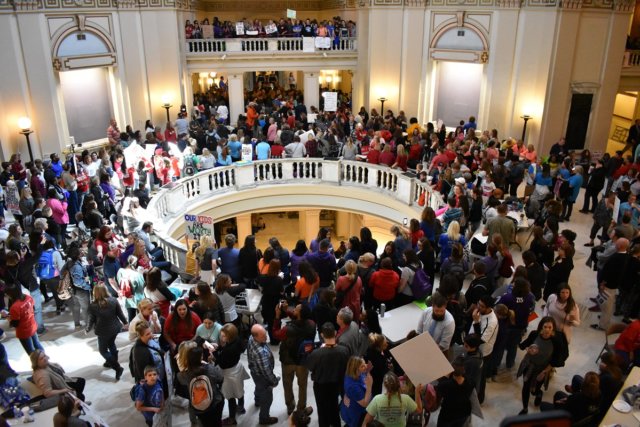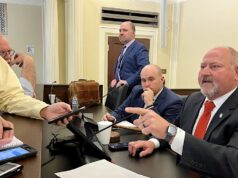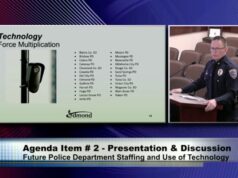

Runoff-primary elections typically feature lower turnouts than their parent elections. Yet without SQ 788 on the ballot as it was in June, Oklahoma could see a large drop in participation come the Aug. 28 runoff.
However, #oklaed issues remain a top priority for many Oklahoma voters, and stakeholders say the topic could shape the outcomes of several legislative runoff elections.
“Sixty-two percent of Republicans think the state is going in the wrong direction while Republicans control everything,” said Chad Alexander, co-host of The Ride on 1520 KOKC and a former chairman of the Oklahoma Republican Party. “What’s the top issue? Education is the No. 1 issue.”
The HB 1010XX effect
During the 2018 legislative session, how to pay for teacher pay raises polarized the Capitol. As educators threatened to walk out of their schools, lawmakers reached a bipartisan agreement on HB 1010XX, which required a 75 percent majority in both chambers because it raised taxes.
But days after the bill’s passage, thousands of teachers descended upon the Capitol to advocate for even more funding. While they expressed frustration with lawmakers across the board, many focused on a core group of conservative Republicans who had opposed nearly all revenue bills over the past two years.
In the House, 19 of those GOP lawmakers voted against HB 1010XX (see document below). Three were term-limited, and of the 16 eligible incumbents, four chose not to run for re-election. Seven failed to top 50 percent of the June vote and now face runoffs. Two others — Rep. Scott McEachin (R-Tulsa) and Rep. Chuck Strohm (R-Broken Arrow) — lost their seats in the primary.
Rep. Tom Gann (R-Inola) drew only one Republican opponent, whom he defeated on his way to face Democrat Darrell Moore in the general election. Rep. Kevin West (R-Moore) and Rep. Tommy Hardin (R-Madill) each drew only Democrat opponents.
 Loading...
Loading...
Meanwhile, three Republicans who voted in favor of the revenue package to fund teacher raises are also in runoffs.
‘People were kind of just fed up’
Angela Clark Little is an administrator and founder of the 34,000-member Oklahoma Parents and Educators for Public Education Facebook group. The group organizes and promotes public education efforts and seeks to raise statewide awareness, though its determinations of which candidates are “pro education” — signified by awarding an apple — have sometimes caused mild controversy.
“Obviously, the 1010[XX] bill played a big factor,” Clark Little said of the ongoing #oklaed movement. “But I feel like people were kind of just fed up with them not listening to their constituents long before that. The vote on 1010 just kind of amplified what they were feeling.”
Jeanette Mendez, a political science professor at Oklahoma State University, echoed Little’s statement.
“I think those that stuck by their guns [and voted no on 1010XX] were representing their interests and not their constituents’ interests,” Mendez said. “I think we had Reps who were used to being in a situation where, if they voted for a tax increase, they would be penalized. They lost sight of the fact this tax increase wasn’t just a regular tax increase, and it had a lot of public support.”
David Bond, vice president of advocacy for the Oklahoma Council of Public Affairs, a conservative-leaning, free-market think tank, emphasized his belief that the lawmakers who voted “No” on 1010XX were not necessarily against teacher pay raises.
“They did see a lot of what was part of the tax packages, I think, as overkill,” he said.
Bond also pointed out that four incumbents who voted for HB 1010XX lost their primaries in June.
“Will their replacements be less likely to raise taxes than they were?” Bond asked. “I think that remains to be seen.”
While SQ 788 and education issues doubtless drove turnout in the primary election, Bond discussed other reasons for high voter engagement.
“It’s become pretty doggone tense at the federal level, and I think that’s affecting political environments all over the country, and I don’t think Oklahoma is immune from that,” he said. “A lot more folks are paying attention to politics, it seems, than has been the case in the past. In some ways, that’s really a good thing, but it also brings in a lot of people who are fresh to a lot of this and in some ways creates what some people would view as chaos. Others would view (it) as more broad political participation.”
What resonates after 788?
Alexander said any incumbent pushed into an Aug. 28 runoff has reason to be worried, especially with lower voter participation.
“The falloff you’re going to see is incredible,” Alexander said. “You’re going to lose more than 200,000 votes in the runoff. It shows you how passionate people are about 788.”
Alexander spoke to what he described as the “most anti-incumbent environment we’ve ever seen.”
“I think, in a traditional year, I would say, if you [an incumbent] got 43 percent and your nearest opponent was in the 20’s, that you’re fine in a runoff,” he said. “But, if your opponent didn’t spend a whole lot of money or do too much and you did a lot, that would tell me that you better run like you’re 20 points behind in the runoff.”
Alexander highlighted districts where several opponents pushed an incumbent into a runoff.
“That almost says to me that the people have decided to fire you, they just didn’t decide who to hire,” he said.
Teachers themselves could be a powerful voting force, especially in Republican runoffs, Alexander said.
“Forty-eight percent of the registered voters in Oklahoma might be Republican, but 52 percent of teachers are registered Republican,” he said. “There are a lot of teachers in the state of Oklahoma and they show up and are 52 percent Republican, they can have a big influence on the runoff.”
Mendez said that, compounded with #oklaed activism, teachers could indeed shape the August runoffs.
“The movement of the teacher walkout really is kind of piece-by-piece,” Mendez said. “They never said, wait ‘til November, they said wait ‘til June. Now they’re saying, hey, you’ve got to show up in August and then they’ll switch to November.”
Little was optimistic about the August runoff-primaries.
“I think that, finally, public education is getting its due (…) in the media,” Little said. “Now it has become more of a common or popular topic. I feel like when people do vote, they take that into consideration a lot more now that they’re aware of the injustices that are happening.”
Republican #okleg runoffs
- SD 10 between Bill Coleman and Amber Roberts
- SD 16 between Ed Crocker and Becki Maldonado
- SD 30 between Lori Callahan and John Symcox
- SD 36 between John Haste and Bill Day
- HD 10 between Rep. Travis Dunlap and Judd Strom
- HD 14 between Rep. George Faught and Chris Sneed
- HD 17 between Jim Grego and John Hass
- HD 20 between Rep. Bobby Cleveland and Sherrie Conley
- HD 27 between Danny J. Sterling and Dave Spaulding
- HD 30 between Rep. Mark Lawson and Kent Glesener
- HD 36 between Rep. Sean Roberts and Louise Redcorn
- HD 38 between Rep. John Pfeiffer and Brian Hobbs
- HD 41 between Roxanne Pollard and Denise Crosswhite Hader
- HD 43 between Jay W. Steagall and Crystal Duncan
- HD 47 between Brian Hill and Beverly Adams
- HD 61 between Kenton Patzkowsky and Brad Raven
- HD 63 between Rep. Jeff Coody and Trey Caldwell
- HD 66 between Rep. Jadine Nollan and Brian Jackson
- HD 68 between Lonnie Sims and Nicole Nixon
- HD 71 between Cheryl Baber and Beverly A. Atteberry
- HD 79 between Dan Hicks and Karen Gilbert
- HD 80 between Stan May and Rep. Mike Ritze
- HD 82 between Nicole Miller and Brad Martin
- HD 98 between Laura Steele and Dean F. Davis
- HD 100 between Julie Roach and Marilyn M. Stark
- HD 101 between Rep. Tess Teague and Robert Manger
Democrat #okleg runoffs
- SD 16 between Mary B. Boren and Rep. Claudia Griffith
- HD 26 between E. Bruce Bushong and Terry W. Hopkins
- HD 41 between Jennie Scott and Sara Peterson
- HD 53 between Cyndy Southerland and Leslie Bonebreak
- HD 68 between Angela Statum and Michael Ross
- HD 99 between Ajay Pittman and Nkem House
- HD 101 between John Carpenter and Madeline Scott
(Correction: This story was updated at 10 a.m. Wednesday, July 11, to remove HD 91 from the list of Democratic runoffs owing to the fact that Sonya Ferguson had withdrawn from the race. It was also updated to correct reference to the size of a Facebook group.)




















